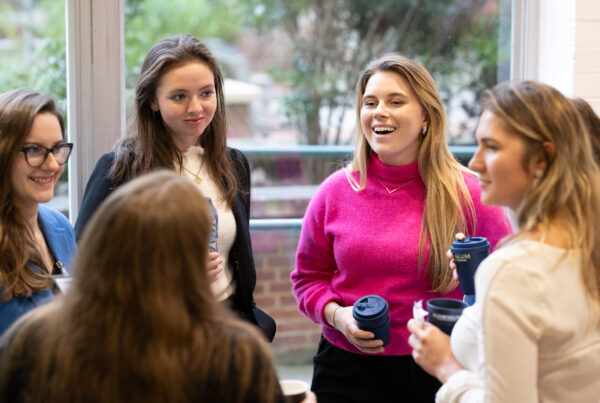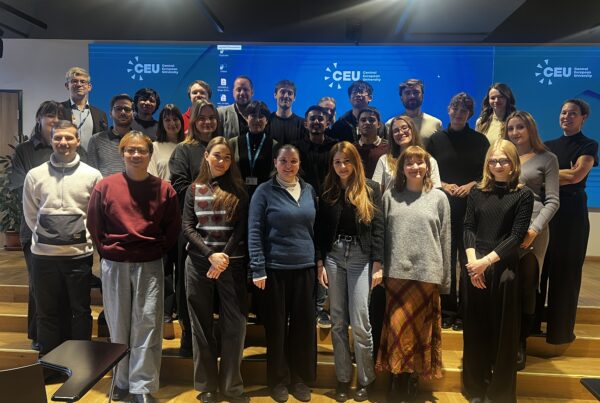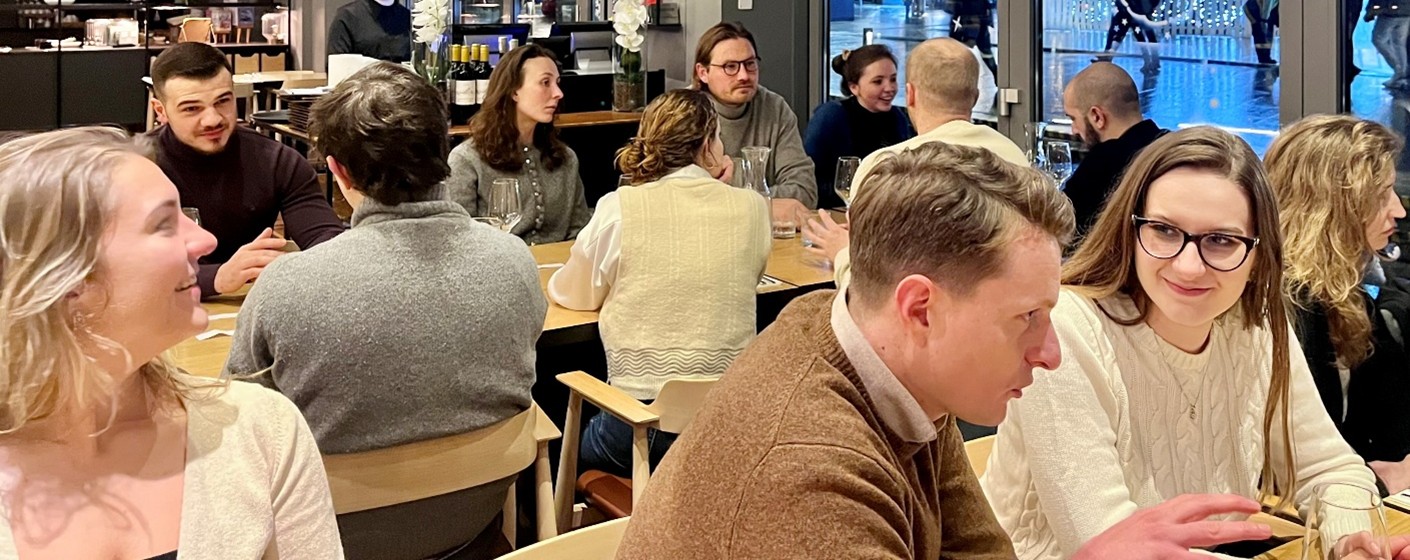
Europaeum Scholars, Ilona Poselużna (Jagiellonian) and Kledian Myftari (Charles / Copenhagen) talk to us about their experiences on the Scholars’ Programme, which they started in March 2024, and tell us what inspired them to apply and what they have learned so far – from how ‘to speak up’ to ‘the quiet power of compromise’.
Photo above: Kledian at the back and Ilona on the bottom right, talking to fellow Europaeum Scholars as part of the module at the Jagiellonian University in Krakow in December 2024.
Ilona Poselużna
PhD Political Science
Jagiellonian University
Research
The EU’s innovation policy towards AI from an IR perspective, focusing on both interstate and EU-level considerations
Kledian Myftari
PhD International Relations and Psychology
Charles University and the University of Copenhagen
Research
Comparative study of Islamist radicalization among Muslim youth in Kosovo and Albania
Can you please tell us what made you decide to apply for the Scholars’ Programme and also, what your research is about?
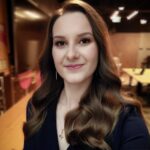
Ilona
I wanted to meet people from across Europe who share the belief that research should serve society – not just the researchers themselves. I am convinced that the social sciences can contribute to change, especially when they are meaningfully integrated into science-to-policy efforts. Coming from Poland, where expert knowledge is often used only ex post to justify political decisions that have already been made, I became interested in how this relationship could be reversed. I wanted to explore how leadership skills could help promote a more proactive role for researchers.
I was also simply hungry for knowledge and skills (and I still am!). The idea of packing my suitcase every two months to work with an interdisciplinary group across leading European universities felt like a dream. After reviewing the programme, I saw that what the Europaeum had created was far more than just another “become a leader” course with corporate-style soft skills. It was a multidimensional intellectual and social training experience—designed to push us toward science-based solutions with real impact.
How could I not join? I’m deeply grateful to the Europaeum team in Oxford for giving me the opportunity to be part of it after the interview process.
In my PhD on artificial intelligence policy, I explore how institutional actors – like the EU – formulate policy in the face of radical uncertainty (not just measurable risks that can be addressed through risk management).
The development of artificial intelligence, with its far-reaching geopolitical implications, presents a prime example of such uncertainty. What does the EU’s AI policy – especially the AI Act – tell us about EU decision-making and integration under conditions of the unknown? I examine how the EU managed to assert strong regulatory control over AI, despite deep uncertainties about the technology’s trajectory and its geopolitical implications. This case, I argue, reveals a great deal about how the EU operates when the future can’t be calculated – only imagined.
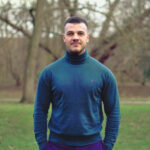
Kledian
When I first received the email from Charles University announcing the Scholars’ Programme, I was intrigued. I hadn’t worked on policy before, and truthfully, I found the idea both exciting and slightly intimidating. But I felt it was the right time to step beyond the comfort of academic research and engage with something new, challenging, and impactful. Not only did the Programme offer a way to “shake” me from familiar routines, but provided an avenue through which to explore the practical dimensions of policymaking–learning by doing, debating, drafting, and delivering. Looking ahead to life after the PhD, I knew I needed to broaden my horizons and better understand how to bridge the worlds of academic research and policy impact. Joining the Scholars’ Programme was a leap of faith, and I’m glad I took it.
My doctoral research looks at the motivations behind the mobilization of ethnic Albanian foreign fighters from Albania and Kosovo during the Syrian Civil War. I examine the historical, cultural, psychological, and religious factors that have shaped these radicalisation pathways, particularly among youth, and I’m especially interested in how collective trauma, identity fragmentation, and online narratives play a role. At first glance, my research seemed quite distant from the group project I’ve been working on in the Scholars’ Programme, which focuses on disinformation and social media. But I’ve come to realise that the two overlap more than I initially had thought. Both explore online vulnerabilities, how narratives are constructed, absorbed, and acted upon, and both try to make sense of how misinformation or ideology spreads in moments of uncertainty. It’s been rewarding to see how these two tracks, my academic research and our team’s policy work, can run parallel and even converge in meaningful ways.
What is the most important thing you have learned from being on the Scholars’ Programme?
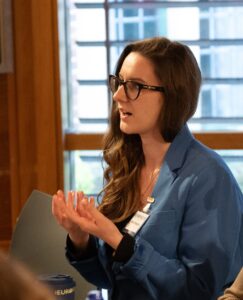
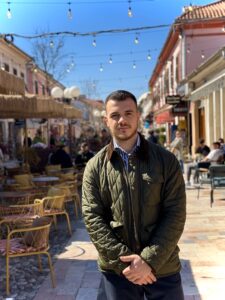
Ilona
Like many women, I was socialised to stay quiet, let others speak and act first — and only step in once ideas run out. That is often the moment women I admire have taken initiative, especially in times of crisis. It is no coincidence that women are more likely to lead organizations during turbulent periods.
The Scholars’ Programme challenged me to rethink that dynamic. It encouraged me to become more proactive – to speak up during the agenda-setting stage, not just in damage control. It also helped me reflect on the nature of risk and what it means to be truly self-aware and context-aware in leadership.
Reflexivity, as I learned it here, is both inward- and outward-looking. What counts as “risky” varies enormously depending on one’s background, position, or political context. For one person, a particular decision may feel like a matter of survival; for another, it is just an exciting adventure to share on social media.
This programme deepened my understanding of how context shapes both personal decisions and policymaking. What works in one setting may fail in another. Recognizing that everything involves a cost – and a kind of risk – is key to thinking more wisely about change.
Kledian
It’s hard to pin down a single most important thing I’ve learned from the Scholars’ Programme, simply because the experience has been so layered and enriching. But if I had to choose, I’d say the biggest takeaway has been the value of a truly multidisciplinary approach to problem-solving. Before joining the programme, I hadn’t fully appreciated just how crucial it is to bring together people from different academic, professional, and cultural backgrounds when trying to address complex policy challenges. Being in a room with individuals who think differently, speak diverse disciplinary languages, and bring multiple lived experiences to the table is not only refreshing, it’s transformative. You realize quickly that no single field or perspective has all the answers, and that the most robust, inclusive solutions emerge precisely from this clashing and blending of ideas.
In addition, the programme has taught me the quiet power of compromise. Group work, especially in such an intense and ambitious setting, demands that we sometimes let go of ideas we hold dear, not because they’re unimportant, but because collective progress often requires individual humility. I’ve learned that successful collaboration often means balancing assertiveness with openness, and knowing when to lead, when to listen, and when to let go. And in that process, something better often emerges, an idea that none of us could have reached on our own.
Reflecting back on the modules of the Programme you have attended so far, which module inspired you the most and why?
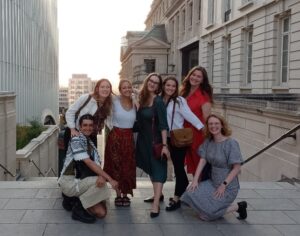
Ilona
I especially enjoyed the last module at Universitat Pompeu Fabra in Barcelona, which focused on AI and digital transformation in the EU – a topic I have been deeply engaged with for over five years. It felt like my intellectual home, with outstanding speakers from academia, the public sector, and industry. I was also proud of our interdisciplinary group; Barcelona felt like a milestone in our collaboration. By then, we had learned how to build a project from scratch, plan, delegate, and problem-solve in the spirit of evidence-based policymaking. Through doing, we are gaining truly transferable skills.
The Brussels module was also fun for me – though ‘fun’ probably isn’t how most people would describe EU institutions. Still, given my long-standing academic focus on the EU and some experience teaching about its institutions and security policy, I felt right at home speaking with people at the Commission and Parliament. Having a shared language is always a good starting point.
Kledian
Each module has brought something unique, but two in particular stand out as especially inspiring: the first module in Oxford and the third in Budapest. The first module in Oxford held a certain magic. There was the thrill of embarking on something entirely new, of meeting the brilliant peers who would become fellow travellers on this two-year journey, and of doing so in a place as historically and intellectually charged as Oxford. That module fostered a kind of wide-eyed curiosity, a sense of stepping into a space that promised to challenge and transform us.
The Budapest module, on the other hand, was deeply thought-provoking. With its focus on the state of democracy, it pushed me to reflect more seriously on the foundational principles of democracies and how fragile they can be, even in places where they’re often taken for granted. It made clear to me how urgent it is to protect democratic values in today’s world, and that doing so isn’t just a matter of politics, but a shared civic duty. It pushed me to reflect on my own role as a citizen, scholar, and young professional, and to question what I am doing to uphold and promote democratic values. The conversations we had in Budapest reminded me that democracy isn’t sustained by institutions alone, but by everyday actions, discussions, and a collective willingness to engage, even when it’s uncomfortable.

